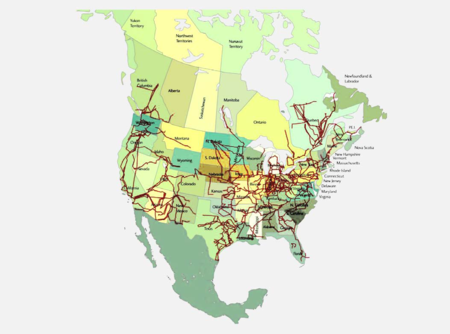Canadian Energy Security

Canada has a relatively high degree of energy security, meaning that the economy is fairly secure. While there a number of ways of measuring this, Canada tends to do well on in this arena. Canada's energy security benefits from there being:
- Virtually no violent conflict
- An abundance of natural resources
- A strong market with a free nature
- A high level of both domestic and foreign investment
- A strong legal and regulatory framework.
- Canada also has a diverse energy mix which helps ensure that over-reliance on one source does not occur.[2]
Countries with fewer of the above attributes tend to have a worse energy security than Canada does.
Limits of Canadian Energy Security
That is not to say that Canadian energy security is absolute, there are obstacles to Canada's energy security:
- The reliance on fossil fuel energy sources has a detrimental effect on the Canadian environment.
- While the investment is strong it does not always get implemented at the proper time to ensure the efficiency of existing infrastructure and is prone to downturns in the energy markets and other shocks.
- Canada's energy productivity is lower than it otherwise might be, and doesn't do as well as countries like the USA and much of Europe.[2]
- There is a lack of provincial interdependence and a higher level of dependence between the U.S and Canadian provinces. While the U.S and Canada have a very peaceful and co-operative relationship, reliance on another nation does not guarantee energy security.[3]
Figure 1 shows the interconnected nature of American and Canadian electrical grids, because the grid crosses the border Canada does not always have control over it. Energy security means that events in another nation or part of the world should not be able to greatly affect a secure nation. If there is an incident in an American section of the grid and it affects the Canadian side, Canada has to wait until the U.S fixes the problem.
To improve the energy security of Canada the nation should focus on lowering the environmental impacts of its activities relating to energy and should seek to lower its energy intensity. Canada should also continue to develop innovative energy technologies, regulatory practices and an even more diverse energy mix.
References
- ↑ G. Caron. Regulating the electricity grid in Canada. University of Calgary School of Public Policy, Oct. 14, 2015.
- ↑ 2.0 2.1 International Energy Agency (IEA). Energy Policies of IEA Countries: Canada 2015 Review. Paris: OECD/IEA, 2016, pp. 9.
- ↑ A. Best et al. Canadian Energy Security: What Does it Mean for Canada? Creative Commons License, 2010, pp. 2.

